MercoPress. South Atlantic News Agency
Tag: US dollar in Argentina’s parallel market
-
Thursday, July 19th 2012 - 08:18 UTC
US dollar reaches new high in Argentina: 6.80 Pesos
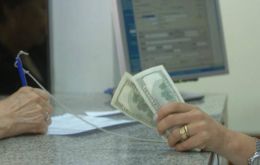
The US dollar reached a new high in the Argentine informal market during Wednesday trading at 6.74 pesos, 25 cents more than on Tuesday while the gap with the official exchange rate jumped to 47.2%.
-
Wednesday, July 18th 2012 - 08:30 UTC
“Informal” and “blue” dollar in Argentina soars to 6.60 and 6.78 Pesos

Argentina's Peso sank in informal trade on Tuesday due to intense demand for US dollars from anxious savers and holidaymakers dodging the government clamp on international currency purchases.
-
Tuesday, July 17th 2012 - 04:42 UTC
As the dollar clamp tightens in Argentina, the greenback traded at 6.31 Pesos
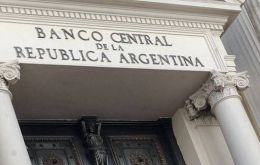
The US dollar in Argentina soared on Monday and was trading in the “blue” or parallel market at 6.31 Pesos considerable higher than last Friday. The official rate climbed a modest half cent to 4.53 and 4.575 Pesos.
-
Tuesday, June 12th 2012 - 08:19 UTC
“The more restrictions on the US dollar, the more people distrust the Argentine peso”

Argentine former economy minister Domingo Cavallo assured that had the restrictions to buy US currency not been applied by the local Government “people would be flocking to buy dollars.”
-
Saturday, June 9th 2012 - 00:37 UTC
Argentina rapidly becoming too expensive for foreign tourists
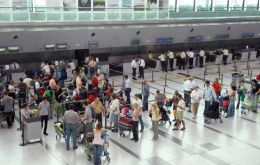
Argentina is rapidly becoming an expensive country for tourists and evidence of this is the declining number of tourists arriving in the country in the first months of the year while the number of Argentine travelling overseas is soaring, according to Mario Lielman, chair of the Buenos Aires Tourism and Travel Agencies Association.
-
Tuesday, June 5th 2012 - 07:58 UTC
New car sales balloon and housing market stalls with Argentina’s “clamped dollar”

Trading in the Argentine money exchange market on Monday was relatively calm with very few operations in the so called ‘blue’ or ‘parallel’ dollar but with none of the expectations announced by members from President Cristina Fernandez administration.
-
Monday, June 4th 2012 - 07:29 UTC
Argentine government wants to regulate the black market for US dollars

Senator and former cabinet chief Aníbal Fernández said on Sunday that the Argentine government is planning, from the open of the black market on Monday, to put pressure on money exchange traders in order for the ‘blue’ dollar rate to not go over 5.10 Argentine Pesos.
-
Saturday, June 2nd 2012 - 04:19 UTC
Argentine senator admits having lost his temper regarding his savings in dollars, “I regret it”
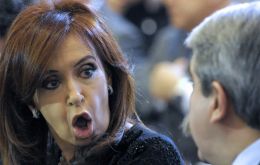
The most outspoken soldier of President Cristina Fernandez, Senator and former Cabinet Chief Aníbal Fernández regretted on Friday his controversial outburst on Thursday when he admitted having savings in dollars and it was nobody’s business what he did with his money.
-
Friday, June 1st 2012 - 01:24 UTC
Argentine top lawmaker admits having his savings in dollars “and I won’t sell them”
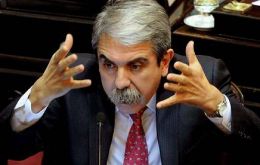
A top Argentine lawmaker came on stage (and lost his temper) when he had to explain why his savings are in dollars after the government of President Cristina Fernandez, including him personally, launched not only strong restriction policies on dollar purchases, but told the population to forget about dollars and start thinking in pesos.
-
Thursday, May 31st 2012 - 02:46 UTC
“Dollar clamp” cases will be dealt in the courts warns Argentine Chief Justice

In spite of the barrage of statements is support of currency exchange controls (or clamped dollar) implemented by the Argentine government, the Supreme Court chief justice admitted that it could soon have to deal with complaints.
